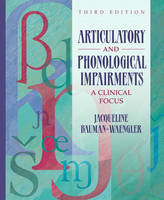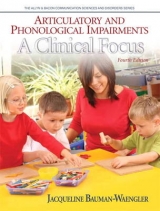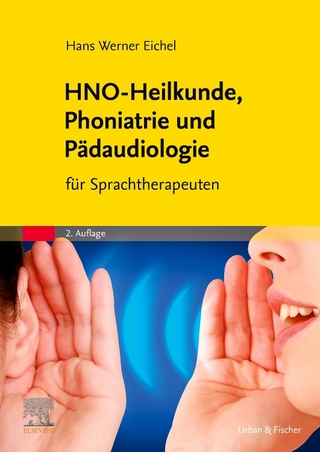
Articulatory and Phonological Impairments
Pearson (Verlag)
978-0-205-54925-2 (ISBN)
- Titel erscheint in neuer Auflage
- Artikel merken
While this text offers a thorough discussion of phonetic principles (also known as the traditional or motor approach) applied to the diagnosis and treatment of motor-based disorders, emphasis is placed on phonemic approaches. Contemporary issues such as features of a phonological assessment, various phonemic-based therapies, and newer nonlinear/ multi-linear phonologies and their role in the assessment and intervention process are treated in detail
New to The Third Edition:
Extensive revisions to Chapter 4 include NEW additional analysis procedures which demonstrate the clinical applicability of distinctive feature theory and natural phonology.
A NEW section inChapter 5 provides new information and research on phonological awareness, emerging literacy, and phonological disorders.
Chapter 6 includesNEW content onregional and ethnic dialects as well as English as a second language, with expanded information on the Telsur Project at the University of Pennsylvania and African American Vernacular English.
NEW Learning objectives that encompass the key points of that chapter have been added to the beginning of each chapter to focus the student learning experience.
NEW learning aids, including case studies, websites, further readings, critical thinking activities, and test questions, at the end of each chapter provide students with the needed tools to assess and improve their understanding of the chapter content.
Preface
All chapters include a “Learning Objectives,” “Summary,” “Websites,” “Further Readings,” “Think Critically,” and “Test Yourself.”
1. Clinical Framework: Basic Terms and Concepts.
Articulation and Articulation Disorders.
Phonetics and Its Relationship to Articulation Disorders.
Speech Sounds versus Phonemes: Clinical Application.
Phonology and Phonological Disorders.
Phonetics versus Phonology: Form and Function.
Articulation Disorders versus Phonological Disorders.
2. Articulatory Phonetics: Speech Sound Form.
Vowels versus Consonants.
Sounds in Context: Coarticulation and Assimilation.
Syllable Structure.
3. Phonetics Transcription and Diacritics.
Phonetic Transcription as a Notational System.
Why Use Phonetic Transcription?
Diacritics.
Clinical Implications.
4. Theoretical Considerations–Practical Application
Phonology.
Distinctive Feature Theories.
Generative Phonology.
Natural Phonology.
Linear versus Nonlinear Phonologies.
5. Normal Phonological Development.
Aspects of Structural and Functional Development.
Aspects of Perceptual Development.
Prelinguistic Stages: Before the First Word.
Transition from Babbling to First Words.
The First Fifty Words.
Segmental Development.
Prosodic Development.
The Preschool Child.
The School-Age Child.
Segmental Form Development.
Learning to Speak and Learning to Read.
Prosodic Feature Development
6. Appraisal: Collection of Data.
Evaluation by the Clinician.
Initial Impression.
Articulation Tests.
Spontaneous Speech Sample.
Evaluation of the Speech Mechanism.
Selection of Additional Assessment Measures.
Special Considerations.
Summary of the Data.
7. Diagnosis: Phonetic versus Phonemic Emphasis.
Preliminary Analysis: Inventory and Distribution of Speech Sounds.
Decision-Making: Primarily Phonetic Emphasis.
Decision-Making: Primarily Phonemic Emphasis.
Measures of Severity and Intelligibility.
8. Therapy for Phonetic Errors.
Decision Making: When to Use a Phonetic Approach.
Therapy Sequence.
Individual Sound Errors.
Misarticulations of [s] and [z]
Misarticulations of [ ] and [ ]
Misarticulations of [k] and [g]
Misarticualtion of [I]
Misarticulations of [r] and the Central Vowels with R-Coloring
Misarticulations of [?] and [?]
Misarticulations of [f] and [v]
Affricate Problems
Voicing Problems
Consonant Cluster Problems
9. Treatment of Phonemic Errors.
Treatment Principles.
Minimal Pair Contrast Therapies.
Cycles Training.
Metaphon Therapy.
Phonemic Disorders with Concurrent Language Problems.
Therapeutic Suggestions.
The Child with an Emerging Phonological System.
Therapeutic Suggestions.
Treatment of Multiple Vowel Errors.
10. Articulatory/Phonological Disorders in Selected Populations.
Development Apraxia of Speech: A Disorder of Speech Motor Control.
Motor Speech Disorders: Cerebral Palsy.
Clefting: Cleft Palate and Cleft Lip.
Mental Disability.
Hearing Impairment.
Motor Speech Disorders: Acquired Apraxia of Speech.
Motor Speech Disorders: The Dysarthrias.
Glossary.
References.
Index.
| Erscheint lt. Verlag | 12.9.2007 |
|---|---|
| Sprache | englisch |
| Maße | 191 x 232 mm |
| Gewicht | 832 g |
| Themenwelt | Medizin / Pharmazie ► Gesundheitsfachberufe ► Logopädie |
| ISBN-10 | 0-205-54925-X / 020554925X |
| ISBN-13 | 978-0-205-54925-2 / 9780205549252 |
| Zustand | Neuware |
| Informationen gemäß Produktsicherheitsverordnung (GPSR) | |
| Haben Sie eine Frage zum Produkt? |
aus dem Bereich



